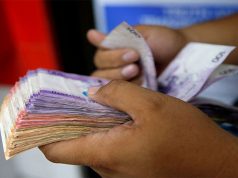MANILA, Philippines – The Office of the President has certified as an urgent measure the proposed Tax Reform for Acceleration and Inclusion (TRAIN) Act.
The Department of Finance (DOF) requested the certification from Malacañang to enable the House of Representatives to expedite it on second and third reading this week.
DOF pointed out in legislative hearings that the proposed measure will allow the government to build or improve 44,000 kilometers of national and local roads, construct more local hospitals and improve existing ones, and achieve the ideal teacher-to-student and student-to-classroom ratios for the benefit of the country’s future workforce.
Congress is to go on sine die adjournment starting June 2, and reopen for the second regular session on July 24, when the President is to deliver his State of the Nation Address.
“We are transmitting this letter of President Rodrigo Roa Duterte certifying to the necessity of the immediate enactment of House Bill No 5636 (the proposed Tax Reform for Acceleration and Inclusion Act) …” Executive Secretary Salvador Medialdea said in his letter to Speaker Pantaleon Alvarez dated May 29.
“The benefits to be derived from this tax reform measure will sustainably finance the Government’s envisioned massive investments in infrastructure, thereby encouraging economic activity and job creation, as well as fund the desired increase in the public budget for health, education and social programs to alleviate poverty,” President Duterte said in a separate letter sent to Senate President Aquilino Pimentel III.
The tax bill proposes to lower the personal income tax rate, giving salaried workers additional take-home pay. However, it will also impose additional taxes on petroleum products, new automobiles, sugar-sweetened beverages, and lift the value added tax exemptions of several items and services, that could result in higher prices down the line.
In his memorandum, Finance Secretary Carlos Dominguez stressed “dire consequences” in the event of Congress’ failure to pass the TRAIN bill.
Without the TRAIN bill, the government’s strategy to embark on an aggressive expenditure program by raising deficit spending to three percent of the Gross Domestic Product (GDP) would lead to an “unsustainable fiscal position,” which, in turn, could trigger a credit rating downgrade possibly costing the government an extra P30 billion in annual debt servicing and P100 billion more in higher borrowing costs for the public, he said.
Such a scenario, he said, could leave the government “more vulnerable to fiscal risk” because it would adversely affect the funding source for increasing state liabilities, such as the pension of uniformed personnel and indigent senior citizens.
With many countries including China already being downgraded, the tax reform bill serves as our country’s immunization from such threat.







